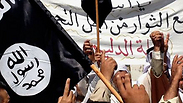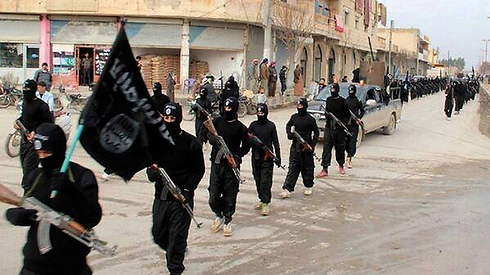

Islamic State leaders captured by Iraqi forces in Syria
Four senior Islamic State commanders captured in Syria after one of leader Abu Bakr al-Baghdadi's personal aides was captured in Turkey in February; coalition members used his mobile phone to lure other four into Syria, then apprehended them; 2 of those captured are most senior Islamic State figures ever taken alive, Iraqi security adviser says.
The international coalition against the Islamic State (IS), led by the United States, announced the capture of five senior Islamic State leaders in Syria Thursday. Reuters reported that a senior aide to IS leader Abu Bakr al-Baghdadi was captured first and forces used his cell phone to facilitate the capture of the other four.
Coalition Spokesman Ryan Dillon called the arrests “a significant blow to IS” while US President Donald Trump tweeted, “five most wanted leaders of IS captured.”
The Islamic State has already lost much of its territory in Iraq but still maintains a small presence in Syria along the Iraqi border. Last month, members renewed their loyalty oath to al-Baghdadi.
Ismail al-Eithawi, who also uses the alias Abu Zaid al-Iraqi, was captured in February in Turkey by Turkish authorities and handed over to Iraqi agents, Iraqi security advisor Hisham al-Hashimi told Reuters on Thursday.
Hashimi described Eithawi as a direct aide to Islamic State leader Baghdadi, responsible for funds transfers to the group's bank accounts in different countries.
Iraqi agents used the Telegram messaging app on Eithawi's mobile phone to lure other Islamic State commanders to cross the border from Syria into Iraq, where they were captured, Hashimi said. Those held include Saddam Jamal, a Syrian who served as the group's governor of Syria's eastern Euphrates region.
Hashimi described Eithawi and Jamal as the two most senior Islamic State figures ever to be captured alive. The capture of all five was announced on Iraqi state TV on Wednesday.
Hashimi said the operation was carried out in cooperation with US forces, part of an American-led coalition fighting against Islamic State on both sides of the Iraqi-Syrian border.
Following Eithawi's capture, Iraqi and American intelligence agents were able to uncover bank accounts used by the group and also secret communication codes he used, Hashimi said.
Apart from Eithawi and Jamal, the operation captured three field commanders: Syrian Mohamed al-Qadeer and two Iraqis, Omar al-Karbouli and Essam al-Zawbai, Hashimi said.
"The noose is tightening around him," Hashimi said, referring to Baghdadi, whose real name is Ibrahim al-Samarrai.
Brett McGurk, President Trump's Special Envoy for the Global Coalition to Defeat IS, addressed the Herzliya Conference Thursday. He said, “In 2014, the Islamic State was a sort of state within Syria. Some 40,000 international fighters congregated there. Wherever IS ruled we witnessed genocide and still today we continue to find mass graves.”
“The Islamic State attempted to destroy the ancient heritage of Syria and funded terrorists the world over, who will try to stage attack in our countries, like the attacks in Paris and Brussels,” he added.
According to McGurk, "By January, 2017, only 50 percent of the fighting had been completed. Since then, Mosul has been liberated, more than 18,000 displaced persons have returned to their homes, and the UN is helping people there. So, too, with Raqqa, which is free today. IS planted landmines in the whole region and we embarked on a large scale mission to remove them.
"The numbers show that the 7 million who lived under the Islamic state have already been freed, with 5 million of them freed in our accelerated operation. These are unprecedented numbers."
“In recent days, our coalition attacks have killed more than 40 senior officials of the Islamic State, while the remaining senior officials have not had much time left,” McGurk said, concluding, “There is no doubt about the outcome. We are winning. These operations are backed by diplomacy when we focus on the day after.”

















